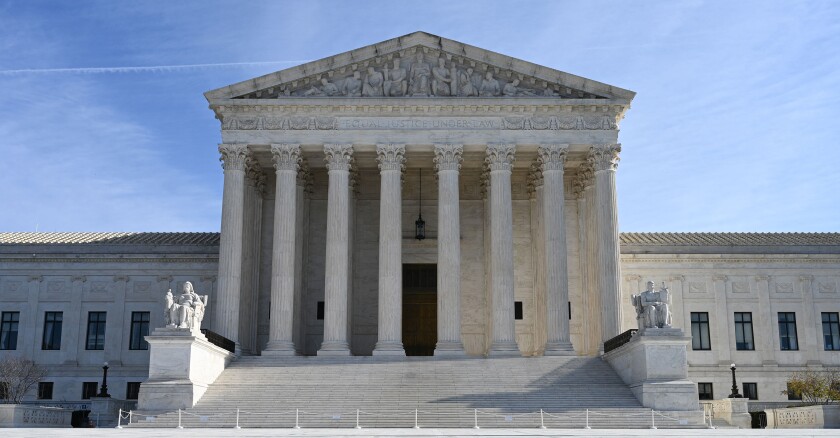Later this year, the court will rule on a long-standing federal law designed to ensure that Native American children removed from their homes by state agencies are not displaced from tribal communities.
Tribes, advocates and many state child welfare agencies fear that a court decision striking down the Indian Child Welfare Act, known as ICWA, could threaten decades of work to ensure that Native kids are not removed from their communities and culture.
Lawmakers in at least half a dozen states have proposed or passed bills this year to put similar language into state law, in case the federal law is invalidated. Eleven states now have such laws on the books.
“ICWA gives the tribe a chance to find a placement where we can keep kids connected to their communities,” said Clare Johnson, counsel for the Northern Arapaho Tribe in Wyoming. “It helps preserve our culture and keeps kids from getting lost in the system.”
Congress passed the Indian Child Welfare Act in 1978, amid growing concern that 25 percent to 35 percent of all Native children were being removed from their families by welfare agencies — with the vast majority placed outside their communities. The separations that happened through adoption and foster care came in the wake of an era that saw hundreds of thousands of Native children forcibly removed from their homes and sent to boarding schools designed to strip them of their culture, language and religion. The act prioritizes family and tribal placements for Native kids in child custody cases, while mandating that tribes be notified of such proceedings.
“Native children were removed from their homes under the thin guise of poverty or lack of electricity or (state agencies) not understanding community-level responsibility for children,” said Sarah Kastelic, executive director of the National Indian Child Welfare Association, a Portland-based nonprofit that supports tribal child welfare systems. “ICWA was put in place to stop that.”
The case before the Supreme Court centers on a white Texas couple who adopted a Native child, and their dispute with the Navajo Nation over the child’s placement. The couple and their supporters have argued that the preference given to tribes under the federal law amounts to race-based discrimination, violating the U.S. Constitution’s equal protection clause. Backers say the law recognizes tribes’ status as sovereign nations, not based on racial status, and a ruling to overthrow it under that argument could upend all federal Indian law.
Followers of the case say it’s unclear how the court will rule, or on which grounds the court might decide to overturn the law. Some states are making backup plans.
Earlier this year, Wyoming passed a measure putting ICWA into state law, while also establishing a state task force that will develop recommendations to strengthen child custody procedures and adapt if a Supreme Court ruling upends the current system.
“We want to be prepared in saying we are going to maintain the status quo under state law,” said Wyoming state Sen. Affie Ellis, the bill’s Republican sponsor and member of the Navajo Nation. “The ultimate goal is to prevent greater disruption. As a human being, as a mom, as a person who practices federal Indian law, I lay in bed at night thinking about possible outcomes, and this seemed like the most prudent course.”
Minnesota also codified the federal ICWA language into state law this year, while New Mexico enacted a state-specific version with expanded protections last session. Eleven states now have either done so or passed a state-specific version of the federal law with greater protections. While a Supreme Court decision overturning ICWA on sweeping equal protection grounds would likely invalidate those state laws as well, other outcomes — such as a ruling that the federal law exceeded Congress’s authority — could leave state protections in place.
“A lot of states and tribes are trying to take ICWA as it exists right now and put it into state law,” said Kate Fort, director of the Indian Law Clinic at Michigan State University, who is representing intervening tribes in the Supreme Court case. “It’s really, really hard to predict a ruling because the court has so many opportunities in front of it, and it’s very difficult to advise states and tribes on how to preemptively protect themselves.”
Lawmakers in Arizona, Colorado, Montana, North Dakota, South Dakota and Utah also have put forward bills this year to codify or strengthen ICWA protections.
“The (child custody) system has been the bane of our existence,” said Montana state Rep. Jonathan Windy Boy, a Democrat and member of the Chippewa Cree Tribe. “Native individuals who got caught up in that system were misplaced into a society that was foreign to them, deprived of their culture and history, of who they are.”
Windy Boy is sponsoring a bill that would duplicate the federal ICWA’s protections in state law. The measure has passed the House and sits in a Senate committee. Montana legislators also are considering an “ICWA for all” proposal that would apply some protections to both tribal and non-tribal child custody cases. Windy Boy said the measures can coexist.
In Utah, lawmakers failed to advance an ICWA bill, despite support from Gov. Spencer Cox and Attorney General Sean Reyes, both Republicans, and tribal leaders in the state. Utah is among 23 states that have submitted an amicus brief asking the Supreme Court to uphold ICWA.
“We are now going to have to react, rather than be proactive,” said state Rep. Christine Watkins, the Republican who sponsored the bill. “I had legislators come up to me and say they didn't want to allow people of other ethnicities to call the shots. There’s a real fear that (Native kids could be removed from tribal communities), and I will tell you that a lot of legislators don’t care.”
In a committee hearing on the bill earlier this year, some lawmakers said they supported the measure’s intent, but had concerns about specific wording or felt it was premature to act before a Supreme Court ruling.
“It creates this dual competing system in our state where tribal children are treated one way and other children are treated differently,” said state Rep. Nelson Abbott, a Republican. While adding that the dual systems were “not necessarily a problem,” he said the language of the bill, such as a section that defers to tribal customs in defining extended family members, was not clear enough to be applied effectively.
Watkins and ICWA supporters say they’ve heard from opponents that decisions in custody cases should be based on what’s best for the child, not tribal preference. Such arguments, they say, rely on false assumptions.
“To think that those situations where a child is harmed or endangered only happen in a tribal home is just a mistaken perception,” said Wyoming state Rep. Lloyd Larsen, a Republican who worked with Ellis to pass the state law this year. “What we heard from our agencies that have a long history working with the tribes is they think it would be a tragedy if ICWA was overturned.”
Arguments that ICWA shows racial preference also are misguided, said Kastelic, with the National Indian Child Welfare Association.
“There's a political relationship that tribes have with their citizen children,” she said. “Tribal nations are best positioned to inform court decisions about what's in the best interest of their citizens.”
Fort, the Indian law expert, said state child welfare agencies in regions with large tribal populations largely support ICWA and have developed working relationships with tribes. In some cases, those agencies have urged lawmakers to ensure those partnerships can continue even if ICWA is struck down.
“ICWA forces states and tribes to work together,” she said. “Just by proximity and needing to work together for kids, you end up developing better relationships. At minimum, the status quo would be the preference.”
©2023 The Pew Charitable Trusts. Distributed by Tribune Content Agency, LLC.
Related Articles











